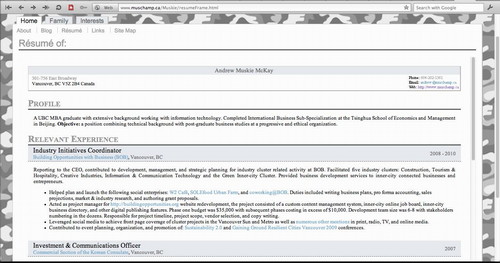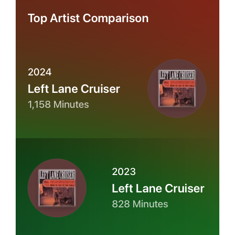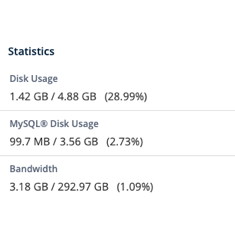The One Page Resume
February 24th, 2012
I’ve been unemployed for too long. There are obviously reasons for this and if I had all the answers, I wouldn’t be unemployed now would I? I try to shore up my weaknesses and leverage my strengths. I spend a lot of time online reading ‘expert’ advice on what to do and what not to do when looking for a job, or writing a cover letter, or during an interview.
Update January 2019: Once again experts are advocating the one page resume, I however am old so apparently if you have 20 years of work experience you can have a second page. I probably would have 20+ years and a fantastic career if it wasn’t for my MBA at the Sauder School of Business. I didn’t update this six year old blog post because of that, I did it because I want to remove the old one page resume file from my web server. If you want to read fresh arguments from experts why your resume should be one page, go here.
Disadvantages to the One Page Resume

There are definite disadvantages to a one page resume, the biggest two are half as much room to cram in keywords and being forced to leave off potentially valuable skills and experience. The other big challenge facing job seekers, besides intense competition, is maintaining their online reputation and ensuring their Google results are acceptable. If a potential employer wants to find out more about me, the information is only a web search away.
My hobbies, my picture, my age, all of this can be found quickly even if I leave them off my resume.
Robots Read Resumes for Keywords
The other reason I have resisted making the change is I’ve put a lot of work into fine tuning my resume to include valuable keywords and the information that hiring managers have remarked upon the most. Many, many HR professionals have seen my resume, my biggest problem is not resume formatting. Creating a one page resume isn’t as simple as deleting the entire second page, you have to reword, rewrite, and relocate various information. I also had to reduce the amount of whitespace in my Microsoft Word file.
.doc is still the standard
MS Word is the default format most employers want in a resume, some may ask for a PDF, I’ve even submitted an HTML resume but that is rare. Even as a longtime Apple fanboy, I’ve continued to use Microsoft Office. I’ve also stuck with the .doc file extension. Additionally, I’ve maintained an HTML version of my resume online for over 27 years. I spent a lot of time converting it to be an hResume. I try to keep these versions in sync.
LinkedIn has partially replaced the Resume
I also try to keep the text on my resume in sync with my LinkedIn profile. My entire employment history, along with all the places I’ve volunteered, the universities I’ve attended is in LinkedIn. I have some control over which information is publicly available and I also can restrict which LinkedIn users can see my entire profile, but as a job seeker you have to surrender a lot of privacy online. Once you surrender your privacy online you are unlikely to ever get it back.
One Resume to Rule them All?
I’m not sure the one page resume is right for everyone or appropriate for every single industry and job posting. Maintaining multiple resumes or regularly cutting and pasting content into and out of your resume is problematic. Customizing your resume for every single job application isn’t always possible due to limitations imposed by career websites for instance. You should only post one resume on your homepage and you’re only supposed to have only one LinkedIn profile.
Though I still have reservations concerning the one page resume, Guy Kawasaki and Vivian Giang are adamant that hiring managers don’t have time and just don’t care to read resumes over one page in length.
Sample Size of One
During the time I used a one page resume it didn’t result in a single job interview, all the interviews I’ve had were the result of my previous two page resume, custom cover letters, and whatever I typed into various job application websites. Recent research has shown recruiters only spend six seconds on your resume and what they look at it your current position, the position before that and your education when deciding whether you are a potential fit.
Keywords VS Networking
In the modern job search there are many gatekeepers, some are robots and they algorithmically rank your resume and your competition. This likely happens long before an HR professional spends six whole seconds reviewing your resume. Ideally you want an “in” thus avoiding one or more gatekeepers. This is why many still advocate old fashion networking. Of course many advocate reaching out via social media too. I recently added the keyword Tableau to my resume and almost immediately got a phone call from a recruiters. So you need to keep improving yourself if you are unemployed.
Now that I’ve passed all three CFA® exams I had hoped my career would turn around. If you have any advice beside the cliche of blogging your way to a better career you can leave it below.
This entry was originaly posted on , it was last edited on and is filed under: Advice and tagged: Job Search, Keywords, Resume.





Muskie. I have a 2 page resume too. No more, no less. Interestingly, I’ve always made a point of asking the people who’ve hired me the question “why”. Every good job I’ve ever had, it was because of my interesting hobbies, secondary employment and volunteer work that provided me with unusual experience that stood out. And all of this is in the second half of page 2. Go figure. My conclusion, most hiring managers are useless twats who don’t know how to read resumes anyways. But they’re not the person to hire you. They’re just the filter you need to get through. It’s gotten so bad that companies now pay incentive bonuses to employees for “employee referrals” and whatnot. You want a job? Put your interesting resume directly in the hands of the person you will report to. They make the decision. They will pull you through the red tape and into your position. You need to network, man. You’re a smart guy with an intelligent resume. It doesn’t mean shit today. In Canada, it’s not what you know, it’s who you know. I should know. Been here all my life. Damn, I love short sentences.
I’ve had a lot of difficulties, but switching from a two page resume to a one page resume is generally a mistake if you have significant skills and experience, you will have to leave off positions and keywords in a one page resume. Modern job application websites use keyword parsers extensively. For instance you could be a software developer with ten years experience and have worked for Microsoft, Apple, and Google, but if the acronyms: SQL, UML, and XML do not appear on your resume, it will not get selected when the recruiter types in “software developer with SQL, UML, and XML”.
Networking doesn’t work for everyone. I’ve networked a lot in the past and found people quicker to use me than to help me. It is also not possible to network if you live in a rural area, or work/study part time. Health problems and other personal problems can make networking extremely difficult. Nowadays experts continue to insist you can blog or even tweet your way to a new job, but that hasn’t worked for me either.
Thanks for leaving a comment.